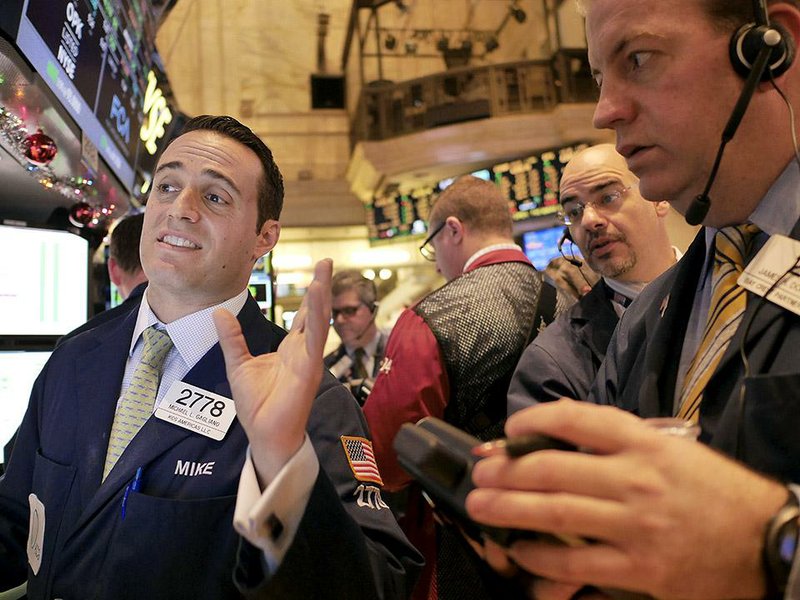NEW YORK -- The Dow Jones industrial average had its biggest surge in three years Thursday, its second straight triple-digit gain after the reassurance by the Federal Reserve that it was in no hurry to raise interest rates.
RELATED ARTICLE
http://www.arkansas…">6,000 fewer sign up for jobless benefits
The Dow Jones average rose 421.28 points, or 2.4 percent, to 17,778.15. The Standard & Poor's 500 index rose 48.34 points, also 2.4 percent, to 2,061.23. The Nasdaq Composite gained 104.08 points, or 2.2 percent, to 4,748.40.
"What we're seeing is a move back to fundamentals," said Karyn Cavanaugh, a senior market strategist at Voya Investment Management. "Earnings continue to be good. ... The U.S. economy is continuing to do well."
Bullish earnings from technology giant Oracle led the rally, which has helped stocks erase an early-December slump. Industrial and health care stocks also logged big gains. Even the energy sector advanced despite another drop in the price of oil.
Fed Chairman Janet Yellen said Wednesday that she foresaw no interest-rate increase in the first quarter of 2015. The comments eased concerns that policymakers would start raising rates at a time when growth outside the U.S. appears to be flagging. They also helped investors look past worries about the effect of a slumping oil price and economic turmoil in Russia, where the currency has slumped.
"Just as with other instances, a dovish Fed is making up for a lot of bad news from Europe and from other parts of the world," Russ Koesterich, chief investment strategist at New York-based BlackRock Inc., said in an interview on Bloomberg Television. "This is why you have this rebound rally after a few days of very harsh losses."
Oracle was the biggest gainer in the S&P 500 index after it reported earnings late Wednesday that beat the expectations of Wall Street analysts. The company said its software and cloud-computing revenue grew 5 percent. The stock rose $4.19, or 10.2 percent, to $45.35. The company's advance helped push up the tech sector 3 percent.
Investors are likely betting that as the economy improves and unemployment continues to fall, companies will start to invest in technology to increase productivity.
"Oracle has been out of favor for some time, and it's probably about time it gets back in favor," said Jerry Braakman, chief investment officer of First American Trust.
"There's no reason why the S&P 500 cannot continue to chug higher," said Jonathan Aldrich-Blake, a U.S. equity fund manager at Ashburton Investments in Jersey, the Channel Islands. "The U.S. economy is one of the safest bets in the world, and the Fed coming out with a dovish tone [Wednesday] just gives investors the confidence they needed."
Should it continue, the recent rally would be the fifth time this year the S&P 500 has come back after falling more than 4 percent from a high. In comparable drops beginning in January, April, July and September, the index needed about a month to erase losses, data compiled by Bloomberg show.
December has been one of the strongest months for equities since the bull market began. The S&P 500 has risen in the year's final month six consecutive times, posting an annual average return of 2.2 percent.
Stocks rose sharply Thursday even as oil resumed its slide.
The price of oil fell $2.36 to close at $54.11 a barrel, after rising as high as $58.71 in morning trading. Oil has fallen almost 50 percent since June, when it peaked at $107 a barrel. Overproduction and weak demand are behind the fall in global oil prices. Brent crude, a benchmark for international oil, fell $1.91 to close at $59.27 in London.
A rapid descent in oil prices was the catalyst for big losses on the stock market a week earlier that erased $1 trillion from equity prices. While falling oil prices are good for consumers, putting more money in their pockets by cutting gasoline prices, they are bad for energy companies.
"There is still a lot of oil out there," said Phil Flynn, senior market analyst at the Price Futures Group in Chicago. "We should continue to see supply basically outpacing demand."
Global oil markets are experiencing "temporary" instability caused mainly by a slowdown in the world economy, Saudi Oil Minister Ali Al-Naimi said, according to comments published Thursday by the Saudi Press Agency. Saudi Arabia and the Organization of the Petroleum Exporting Countries would find it "difficult, if not impossible" to give up market share by cutting crude production, he said.
"It's the effective end of OPEC," Francisco Blanch, head of global commodities and derivatives research for Bank of America, said on Bloomberg TV on Wednesday. "Basically Saudi has pulled the plug and is letting the market balance itself. If the price of oil doesn't have a moderating agent, it's going to be all over the place."
U.S. government bond prices fell Thursday. The yield on the benchmark 10-year government Treasury note climbed to 2.21 percent from 2.14 percent a day earlier.
In currency trading, the euro fell to $1.2274 from $1.2329 the previous day. The dollar edged higher against the Japanese yen, climbing to 118.91 yen from 118.83 yen.
Prices for precious and industrial metals were little changed. Gold edged up 30 cents to $1,194.80 an ounce, silver was essentially unchanged at $15.93 an ounce, and copper fell 2 cents to $2.85 a pound.
Information for this article was contributed by Steve Rothwell of The Associated Press and Callie Bost, Lu Wang and Moming Zhou of Bloomberg News.
A Section on 12/19/2014

